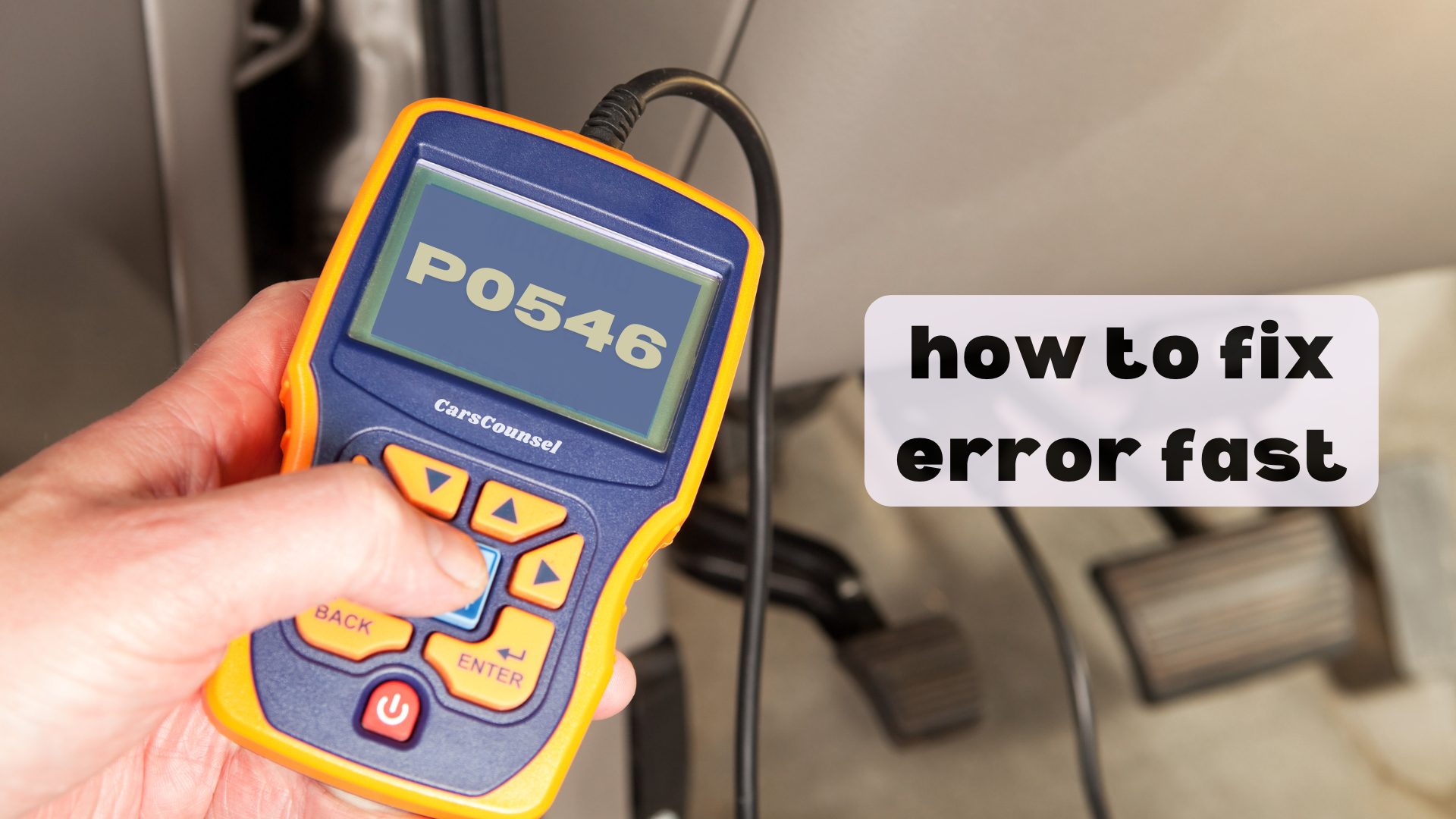When your vehicle shows a P0546 error code, it means there’s an issue with the Exhaust Gas Temperature (EGT) sensor circuit.
But don’t worry, you can fix this problem quickly and easily. First, use an OBD-II scanner to confirm the trouble codes and find any related trouble codes.
Then, check the EGT sensor and its wiring for any damage or rust.
Want to know what else could be causing this issue and how to fix it without much trouble? Let’s look into the common causes and simple solutions.

Quick Navigation
Key Takeaways
- Replace the bad EGT sensor: Install a new EGT sensor to get accurate exhaust temperature readings again.
- Check and fix the wiring: Look for any frayed, damaged, or corroded wires and connectors. Fix or replace them as needed.
- Update the engine control software: Make sure the engine control software is current to keep the sensor and engine running smoothly.
- Clean or replace the DPF: Regularly clean or replace the Diesel Particulate Filter to avoid clogs that can mess with the EGT sensor readings.
What Is the P0546 Code?
The P0546 code means there’s a problem with the Exhaust Gas Temperature (EGT) sensor circuit. This sensor is crucial for the Engine Control Module (ECM) to keep the engine running smoothly and efficiently.
EGT sensors come in different types, like thermocouples and resistance temperature detectors (RTDs), which measure the exhaust temperature. If these sensors detect unusual exhaust temperatures, the ECM adjusts things like fuel injection timing and turbocharger boost to keep the engine efficient.
When the sensor circuit doesn’t work right, it gives incorrect readings, messing up these adjustments and causing the P0546 code to appear. You’ll likely see the check engine light turn on, indicating you need to diagnose and fix the issue.
Knowing about the different EGT sensors and their role in monitoring exhaust temperature can help you address this problem effectively.
Importance of EGT Sensors
EGT sensors are crucial for keeping your engine running efficiently. They provide accurate exhaust temperature data to the engine’s computer, which helps improve fuel injection and turbocharger settings. Knowing why EGT sensors are important and how long they last is key for vehicle maintenance.
Here’s why EGT sensors are important:
- Engine Performance: They give accurate data that helps fine-tune the engine for peak power and efficiency.
- Fuel Economy: Good EGT readings lead to better fuel combustion, which saves fuel.
- Emissions Control: They help cut down on harmful emissions by keeping exhaust gases at the right temperatures.
- Sensor Lifespan: Regular checks and timely replacements make EGT sensors last longer, preventing unexpected problems.
Keeping your EGT sensor in good shape is vital for a well-running engine.
Triggering the P0546 Code
Problems with the exhaust gas temperature sensor can trigger the P0546 code, meaning something’s wrong and needs fixing right away. When this sensor isn’t calibrated correctly, it sends wrong information to the Engine Control Module (ECM).
This messes up the ECM’s ability to control fuel injection timing and turbocharger boost, hurting overall engine performance. Your exhaust system needs accurate readings to work efficiently.
A faulty sensor can make the ECM think the exhaust temperatures are abnormal, causing the check engine light to come on. This code usually means something’s off with the exhaust system’s temperature monitoring, so it’s important to diagnose and fix it quickly to avoid more engine problems.
Common Causes
A faulty sensor is often the main reason for the P0546 code, but there are other common causes too:
- Faulty Sensor: Sensors can wear out or get damaged over time, leading to incorrect readings.
- Damaged Wiring: Wires that are frayed or corroded can mess up the circuit and cause wrong signals.
- Bad Electrical Connections: Loose or corroded connections can mess with how the sensor works.
- Environmental Factors: Extreme hot or cold temperatures can make problems worse for sensors and wiring.
Regularly checking and maintaining your sensors and wiring can help prevent these issues.
Fixing these common problems can ensure your engine runs smoothly and accurately.
Faulty Sensors
Faulty sensors can often be the main reason behind the P0546 code, affecting the accuracy of exhaust gas temperature readings and engine performance. When an EGT sensor isn’t working right, it might send wrong information to the ECM, leading to improper fuel injection timing and turbocharger boost pressure.
Start by checking if the sensor is calibrated correctly to ensure it’s giving accurate readings. If calibration doesn’t fix the problem, you probably need to replace the sensor.
Over time, sensors can wear out due to high heat and contaminants. A new sensor will give accurate exhaust temperature readings again, improving your engine’s performance.
Always make sure the new sensor is compatible with your vehicle to avoid more issues.
Wiring Issues
When you’re trying to figure out the P0546 code, you should take a good look at the wiring and connectors to see if there’s any damage or rust that might mess with the sensor’s signal. Making sure the wires are in good shape and fixing any rust on the connectors is key for getting accurate EGT sensor readings.
Here’s what to do:
- Look Over Everything: Check the wires for any cuts, frays, or burn marks.
- Check Connectors: Look at the connectors to see if they’re rusty or have loose pins.
- Test the Wires: Use a multimeter to check if the wires are continuous and have the right resistance.
- Fix or Replace: Fix any damaged wires or replace rusty connectors to get things working right again.
Environmental Factors
After fixing wiring issues, think about how extreme weather can make sensor and wiring problems worse, leading to the P0546 code.
Climate plays a big role in how well EGT and IAT sensors work. Really hot or cold temperatures can make these sensors give wrong readings or stop working. High heat can damage sensor parts and the wiring insulation, causing electrical shorts or open circuits.
On the other hand, extreme cold can make materials brittle, which increases the chance of breaks in the wiring.
Knowing about these environmental factors helps you take steps like using heat-resistant materials and good insulation to keep sensors working well despite the weather.
Notable Symptoms
You might notice your car losing power when you try to accelerate if the P0546 code pops up. This problem can mess with your car’s sensors and engine performance, causing several issues that can make driving less enjoyable:
- Check Engine Light: The light stays on, meaning something needs fixing right away.
- Worse Gas Mileage: You’ll see a drop in how far you can go on a tank of gas, which can be expensive over time.
- More Exhaust Smoke: You might notice more smoke coming from the exhaust, which could cause your car to fail emissions tests.
- Rough Idling or Stalling: The engine might run rough or even stall, especially when you’re driving slowly or stopping.
These problems show why it’s important to fix the P0546 code quickly to keep your car running well.
Diagnostic Steps
To fix the problems caused by the P0546 code, start by using an OBD-II scanner to get the trouble codes and freeze-frame data from the Engine Control Module (ECM).
Check for any other related codes.
Then, test the Exhaust Gas Temperature (EGT) sensor to make sure it’s working correctly.
Look at the wiring and connectors for any signs of damage or corrosion that could mess up the signal.
Do a smoke test to find any leaks that might affect the EGT readings.
Also, check the intake manifold and related parts for any vacuum leaks.
Write down all the symptoms and conditions when the code shows up.
Effective Solutions
Replacing faulty EGT or IAT sensors is essential for getting accurate readings and ensuring your engine runs well. Regularly checking these sensors can help prevent problems and keep your engine in top shape.
Here’s how to fix the P0546 code:
- Replace Bad Sensors: Install new EGT or IAT sensors to get accurate data again.
- Fix Wiring and Connectors: Repair or replace any damaged wires and rusty connectors to ensure good communication between the sensors and the ECM.
- Check and Clean DPF: Clean or replace a clogged Diesel Particulate Filter (DPF) to prevent exhaust issues.
- Update ECM Software: Sometimes, updating the ECM software can improve sensor accuracy and overall performance.
More OBD-II Codes
Frequently Asked Questions
Can Driving With a P0546 Code Cause Long-Term Engine Damage?
Driving with a P0546 code can make your engine run poorly and cause potential risks. Ignoring it might lead to long-term damage, such as higher exhaust emissions and worse fuel efficiency, which can eventually harm important engine parts.
How Much Does It Typically Cost to Repair a P0546 Code?
Usually, about 70% of the repair cost comes from parts. Fixing a P0546 code generally costs between $150 and $400. The final price depends on things like replacing the sensor, fixing the wiring, or dealing with any issues with the car’s computer.
Are There Any Temporary Fixes for a P0546 Code?
If you’re dealing with a P0546 code, you can try some quick fixes like cleaning the EGT sensor and its connectors, checking the wiring for any damage, and clearing the code with an OBD-II scanner. These steps might help you keep things running smoothly until you can get a permanent fix.
What Tools Are Necessary to Diagnose a P0546 Code?
Imagine your car suddenly loses power. To figure out a P0546 code, you’ll need a code reader to check for fault codes and a multimeter to test the sensor and wiring. These tools help you find the problem accurately.
How Long Does It Take to Fix a P0546 Code?
Fixing a P0546 code usually takes a few hours. First, you’ll need to diagnose the problem to figure out what’s wrong. Then, you’ll use solutions like replacing sensors or fixing wiring. The exact time can vary depending on the specific issue.
Conclusion
Picture yourself driving smoothly down the highway, your engine running perfectly because you fixed that P0546 code.
By quickly diagnosing and fixing any issues with the EGT sensor, you’ve made sure your vehicle is running at its best.
Remember, regular maintenance and prompt repairs not only prevent future problems but also keep your engine in top shape.
So, grab that OBD-II scanner, check those sensors, and enjoy the peace of mind that comes with a well-maintained car.
Your engine will thank you.

